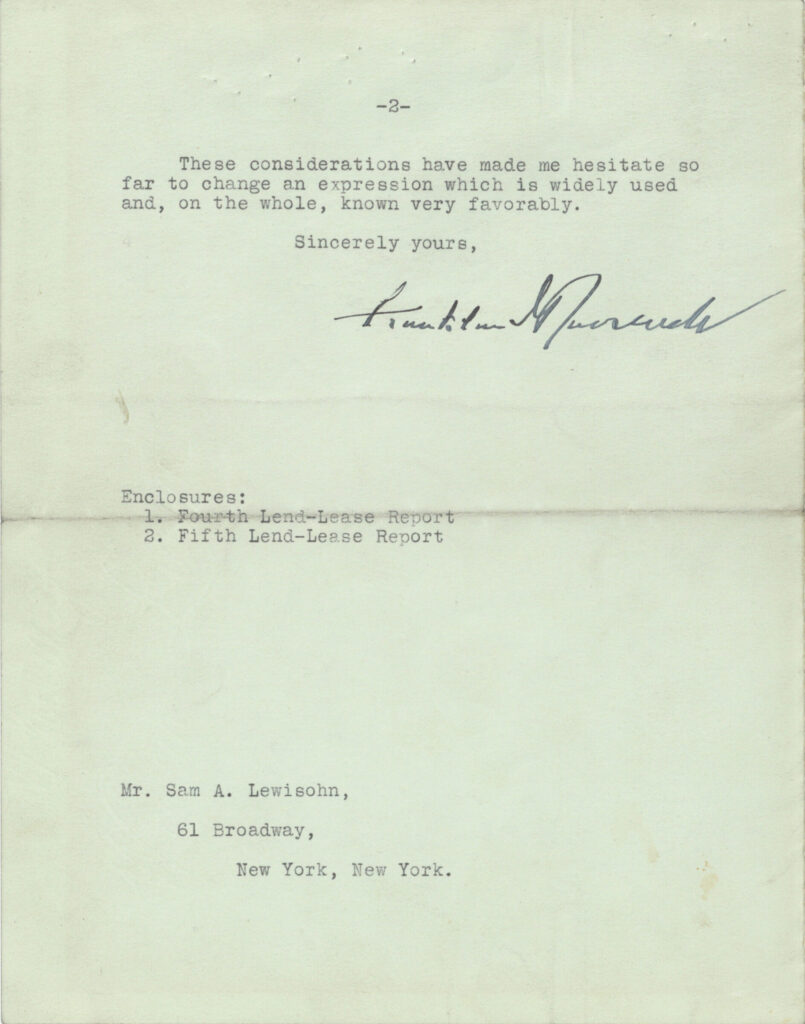FDR Amidst World War II: “Our war production obviously has one purpose – use against the enemy.”




He defends the Lend Lease Act, under which the United States supplied its World War II allies, and says “recent hearings in the Congress on the renewal of the Lend-Lease Act have shown a gratifying awareness” of the value of Lend Lease
- Currency:
- USD
- GBP
- JPY
- EUR
- CNY
As for the name Lend Lease, which was controversial, he writes, “The expression has by now gained international currency, and is used to describe, for example, British aid to the Soviet Union as well as our own aid to Britain and to the Soviet Union. These considerations have made me hesitate so...
As for the name Lend Lease, which was controversial, he writes, “The expression has by now gained international currency, and is used to describe, for example, British aid to the Soviet Union as well as our own aid to Britain and to the Soviet Union. These considerations have made me hesitate so far to change an expression which is widely used and, on the whole, known very favorably.”
One of the finest Roosevelt letters from World War II that we have ever carried
Under the Lend Lease Act, which was in effect from 1941 to 1945, the United States supplied its World War Two allies, including the United Kingdom, France, the USSR, and China, with weapons and other supplies. The aid was given free of charge on the basis that such help was essential for the defense of the United States, and what was left over after the war would be returned to the U.S. A total of $50.1 billion (equivalent to over $700 billion today) worth of supplies was shipped, or 17% of the total war expenditures of the U.S. And the aid was crucial in keeping the allies afloat, justifying Roosevelt’s hopes.
But the Lend Lease Act, and its name, were controversial, and Roosevelt, eager to ensure public consent, explained to the public and the press that his plan was comparable to lending a garden hose to a neighbor whose house is on fire. “What do I do in such a crisis?” the President asked at a press conference. “I don’t say … ‘Neighbor, my garden hose cost me $15; you have to pay me $15 for it’…I don’t want $15 – I want my garden hose back after the fire is over.”
Typed letter signed, on White House letterhead, two pages, Washington, March 4, 1943, (the year that saw the turning point of the war, to Mr. Sam Lewisohn of New York, defending Lend Lease and explaining the drawbacks of trying to change its name. Lewisohn was president of the American Association for Labor Legislation, a member of the executive council of the National Committee on Prisons and Prison Labor, and the author of two books on industrial problems. He had served FDR as chairman of the state legislative committee investigating of prison administration.
“Dear Sam: Thank you for your letter of February 8. I was much interested in your personal reflections on the problems arising from the title ‘Lend-Lease’, which now officially describes one aspect of our war effort. Our war production obviously has one purpose – use against the enemy. Whether it is so used by Americans or Chinese, Russians or British is immaterial so long as it is used to the best effect. As you say, it is an anomaly to seek to describe such war time effort in terms of commercial book-keeping – it is not only an absurd but a dangerous anomaly. Various spokesmen for the Administration have been concerned to state this view, to the Congress and the public, and the recent hearings in the Congress on the renewal of the Lend-Lease Act have shown a gratifying awareness of the problem. I enclose two documents which have dealt with the problem. We have considered finding a different name for lend lease from time to time, and I am much interested in your suggestions. The name chosen must distinguish what is now called ‘lend-lease’ from joint military efforts and expeditions. There must also be taken into account the fact that among the nations receiving ‘lend-lease’ are neutrals and non-belligerents. The expression has by now gained international currency, and is used to describe, for example, British aid to the Soviet Union as well as our own aid to Britain and to the Soviet Union. These considerations have made me hesitate so far to change an expression which is widely used and, on the whole, known very favorably. Sincerely yours, Franklin D. Roosevelt “
It is a real rarity to find a Roosevelt letter from the war with such fine and stirring content. It’s the finest one we have ever carried.

Frame, Display, Preserve
Each frame is custom constructed, using only proper museum archival materials. This includes:The finest frames, tailored to match the document you have chosen. These can period style, antiqued, gilded, wood, etc. Fabric mats, including silk and satin, as well as museum mat board with hand painted bevels. Attachment of the document to the matting to ensure its protection. This "hinging" is done according to archival standards. Protective "glass," or Tru Vue Optium Acrylic glazing, which is shatter resistant, 99% UV protective, and anti-reflective. You benefit from our decades of experience in designing and creating beautiful, compelling, and protective framed historical documents.
Learn more about our Framing Services













































































































